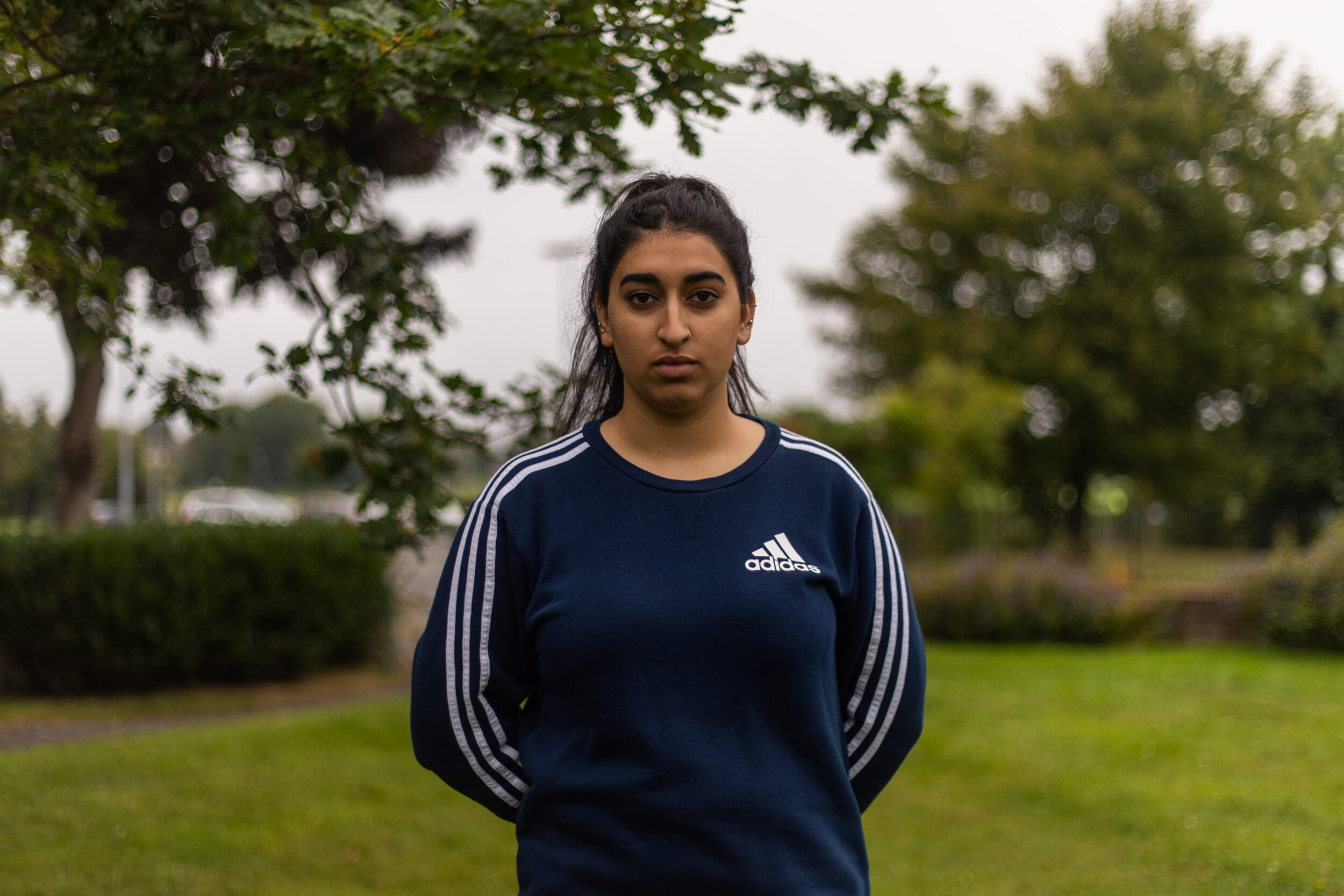
"The Irish identity is undoubtedly a part of who I am, as I hail from Clare. While some might label me as being from the countryside, I know that people in Dublin often view it that way. It's not just the physical location, but it's also reflected in how I conduct myself, my way of speaking, and the company I keep. I've become deeply ingrained in the local culture here, which is distinctly different from my homeland's culture. I don't genuinely align myself with Pakistani culture, to be completely frank. Except for when I'm at home, my identification is more connected with my religion rather than Pakistani customs. I do acknowledge my uniqueness, and I consistently remind myself that I stand apart from the crowd, not adhering to the norms of the Irish people around me. This recognition empowers me to fully embrace my religion."

"I was born and raised here. My mother is Irish too, so a significant part of my identity is Irish. I've known no other way of life. Having a Caribbean father and an Irish mother, both of whom embraced Islam, is a true blessing. Their courage to let go of much of their original cultures, as they didn't align well with Islam, is something I admire. As I was growing up, my experiences were predominantly influenced by Islamic culture, though elements like food may have differed. I'm truly grateful that my upbringing was centered around Islamic values. While I used to visit my Irish relatives up North in Derry, there always seemed to be something missing. The connection there was more about blood than shared faith. Growing up within the Muslim community, attending a Muslim National School, I formed a strong bond with that aspect of my identity. My Muslim friends became more than just friends; they became a second family to me."
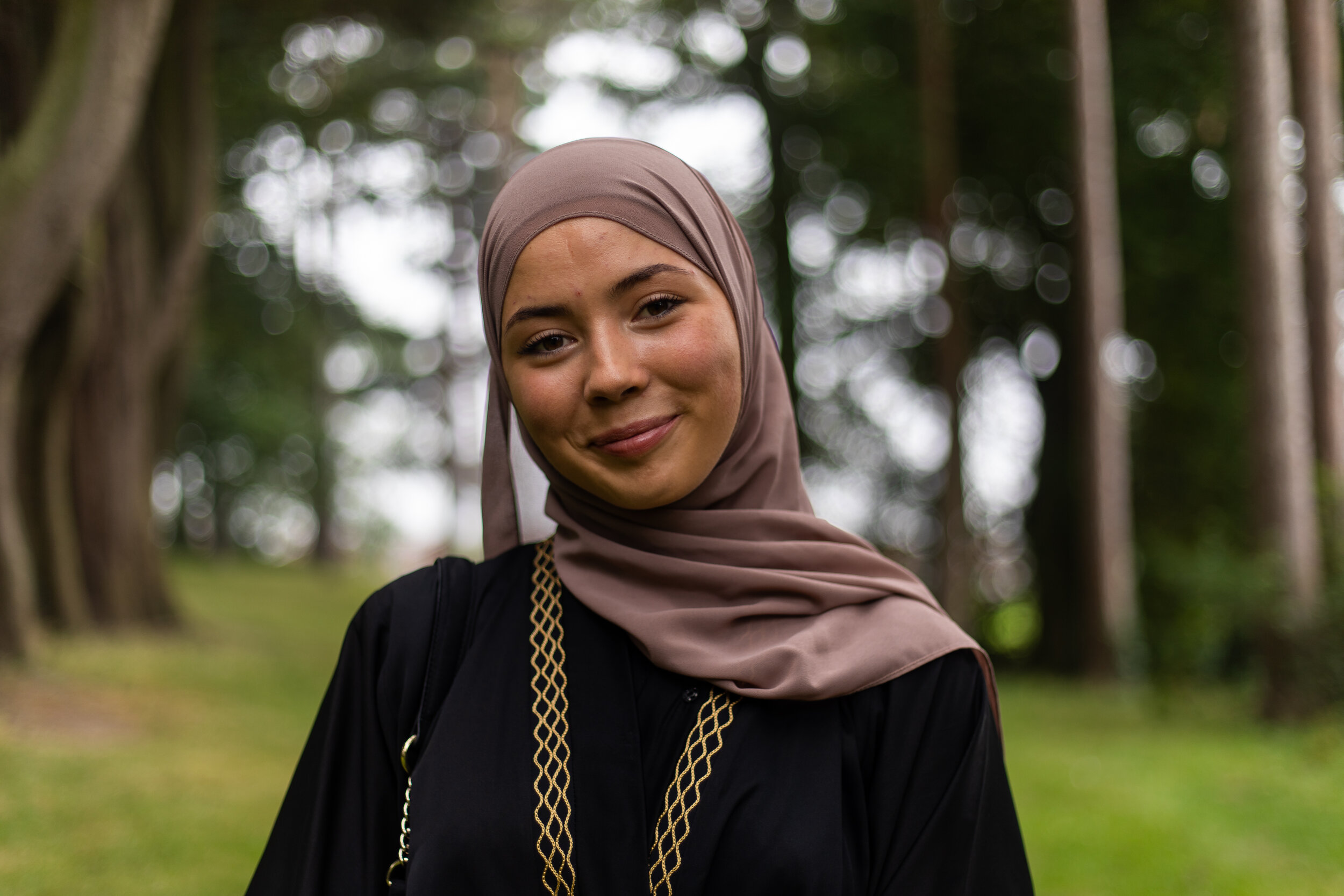
"I hail from North Dublin, with a heritage deeply rooted in Irish culture. Growing up, Christmas and Sunday dinners were fixtures in my life, as was attending church and participating in my communion and confirmation ceremonies. A pivotal moment occurred when I engaged in a conversation with a friend about the hijab, eventually leading me to embrace Islam and take my shahada on a Friday—a fresh start that empowered me.
Since then, I proudly wear the hijab, using each act of kindness as a testament to my faith. However, my father expressed concerns about potential racial attacks after I began wearing the hijab. While my family embraced my faith, wearing the hijab remains a personal commitment to Allah and myself."
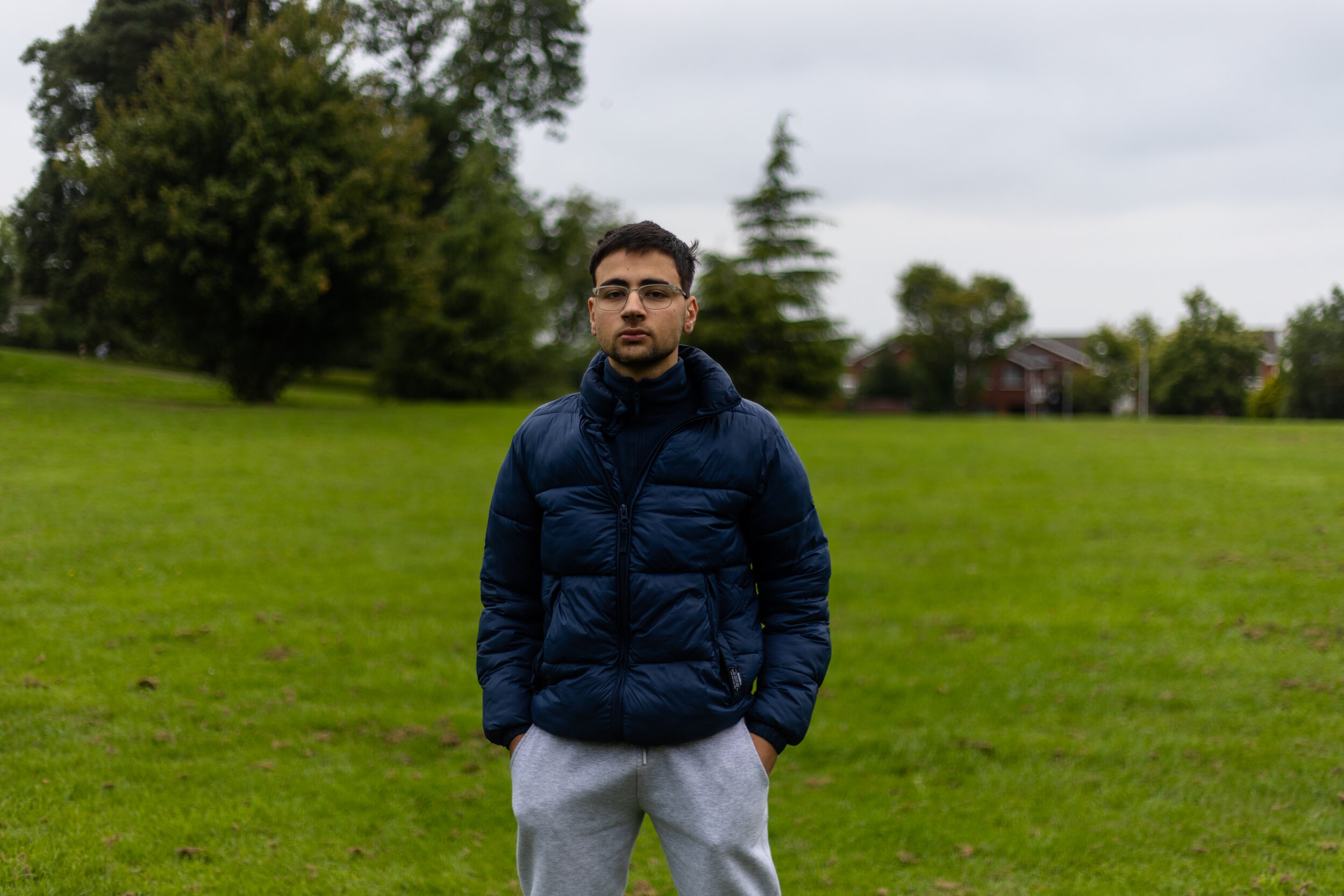
“As a Palestinian, we share the same identity as the Irish by fighting the oppressors. The Irish are freedom fighters. By sharing the same history, it makes you want to live in a free state like Ireland. You want to be free like the Irish, and that is my Irish Identity.”
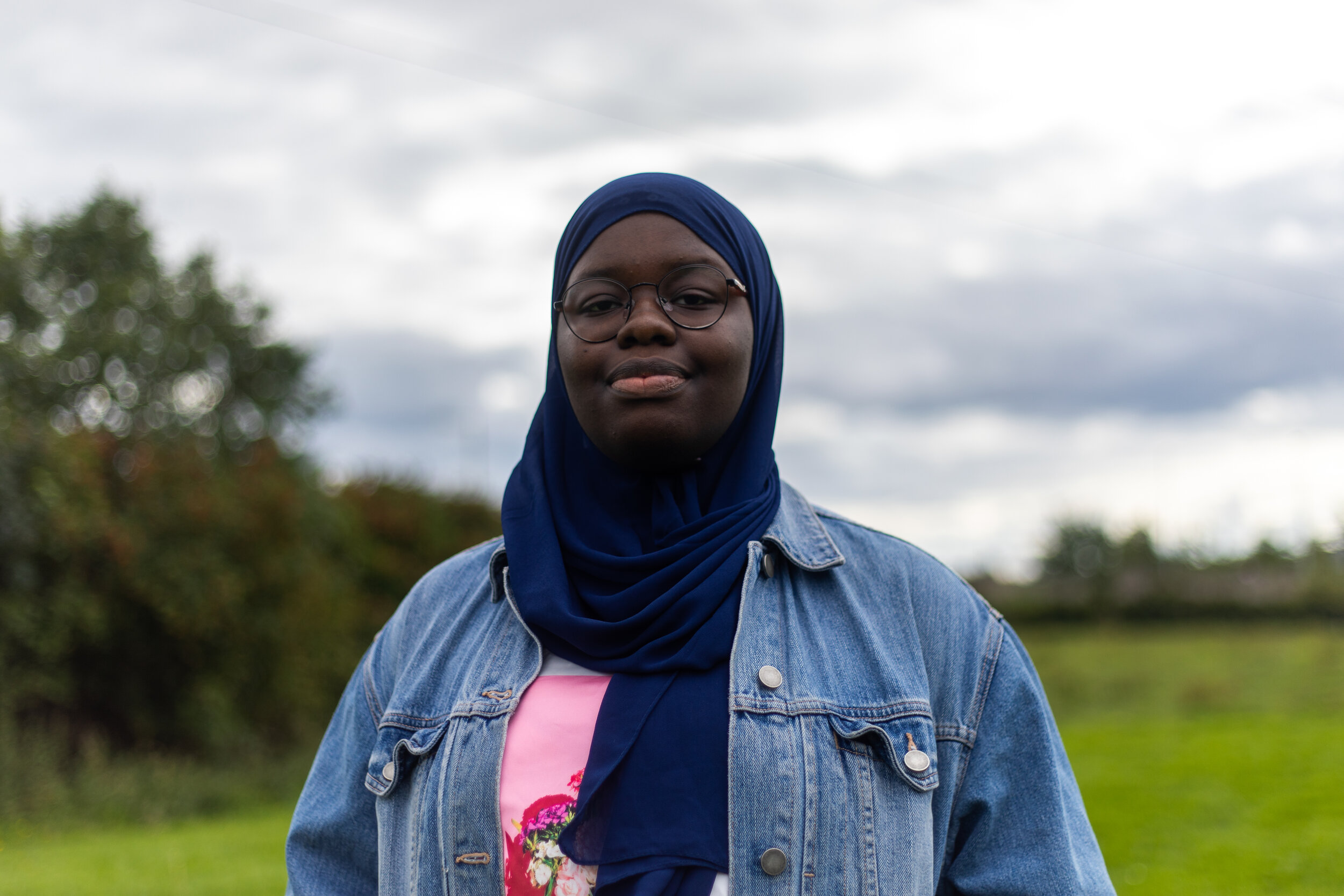
“When I first think of myself, my initial thought is that I'm Muslim. It's the way Islam governs me. I try to do everything according to the guidelines in Islam. It's a really important part of me. At times, I do feel Irish, and at times I don't. I don't know why that is, but maybe it's because I don't look like the typical Irish person or have an Irish accent. I know other Africans who do, but I don't. Even though I don't know any other place besides Ireland since I was born here, it still feels odd at times.”
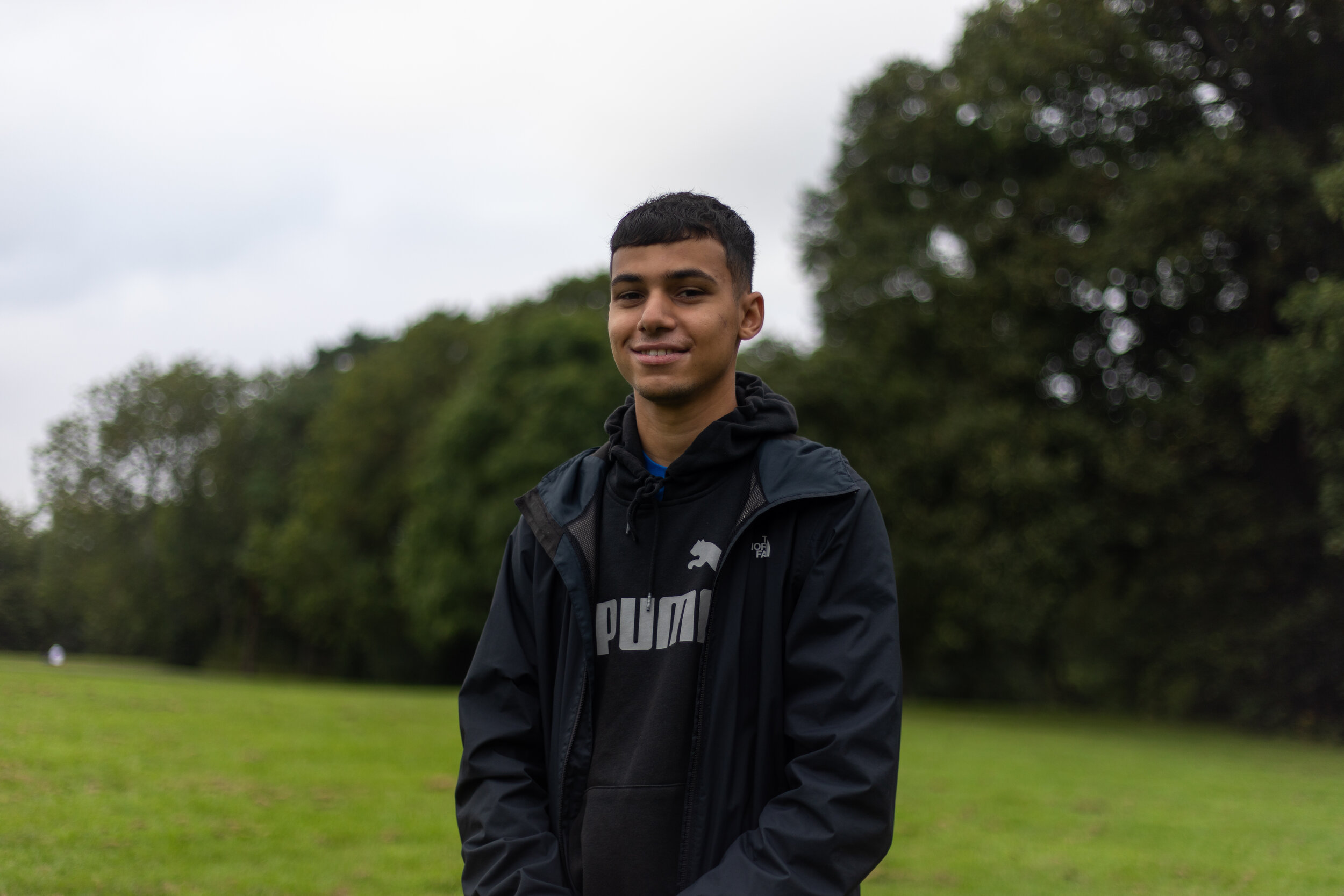
“Egypt will always have a place in my heart, and so will Ireland, the place I resided. But I will always be seen as a foreigner here in Ireland, even if you're born here. But even when I go to Egypt, I am also seen as a foreigner. They don’t think that you're one of them. Obviously, you’re coming from Europe and Ireland; it's different. In both places, I'm not seen as one of them. Not being recognized as Egyptian when going to Egypt is good in a way. Everyone goes to ask you questions like how's this and that, especially about growing up in Europe. I'm made to feel like a celebrity, but it's nothing but excitement when I go over there.”
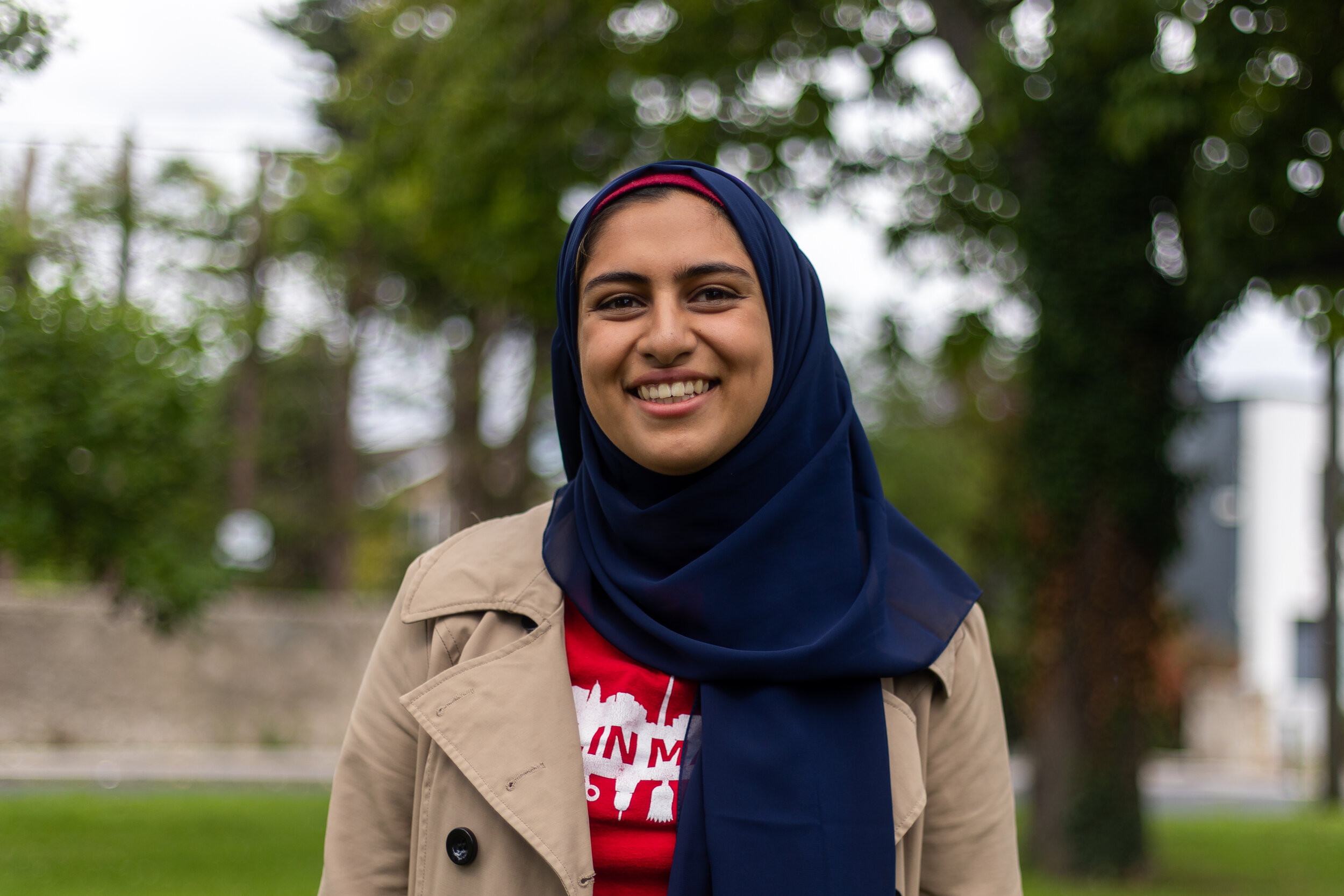
I feel like I don't always fit into both my Muslim and my Irish community. Because the Irish I hang out with are the very stereotypical type of Irish girls, I don't do all the things they may do or go to the places the might go to or hang around the same people they hang out with, and sometimes I feel that can make me separated from them. But it never made me feel not welcomed in Ireland. I don't fully fit into the Muslim community because I spend time with people who are not Muslim, the majority of my friends are not Muslim, and my school only has two other Muslims. So I don't fall into a Muslim circle I think I fit into a bit of both, which is part of my identity: that I'm equally in a Muslim society and an Irish ”
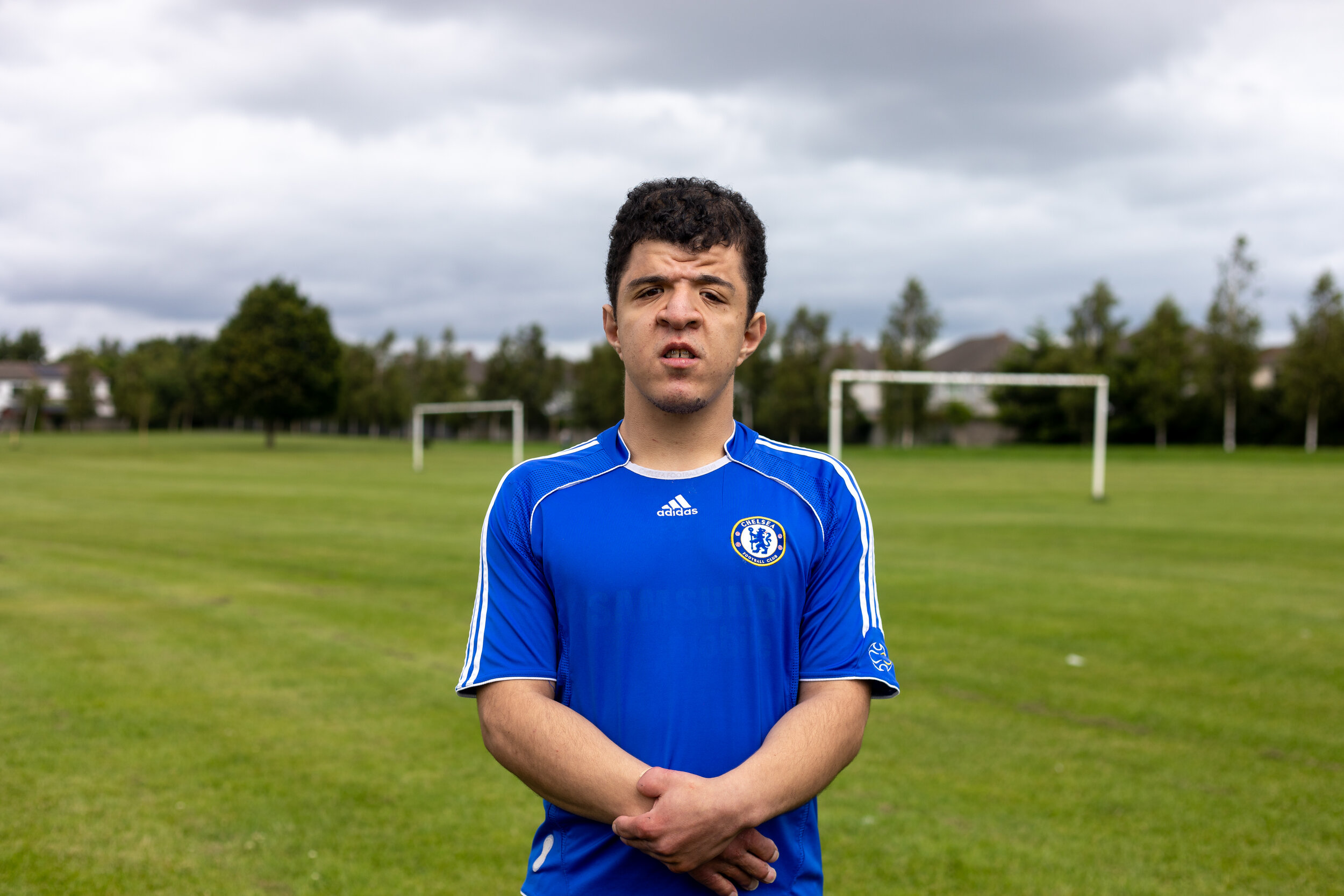
"My Irish citizenship is affording me a better education. It boasts a good healthcare system and robust support for its citizens. If I were in Algeria, I wouldn't have access to this type of support. They lack support for people with disabilities and have no schools that cater to those with disabilities. I was the 25th person born with Apert Syndrome in Ireland. Because of the support, I am who I am today. All the surgeries that I had were a mix of ups and downs for me, which impacted me. I had to stay in different hospitals for a while. All of the struggles and journeys that I've been through have made me a strong person. Alhamdulillah."
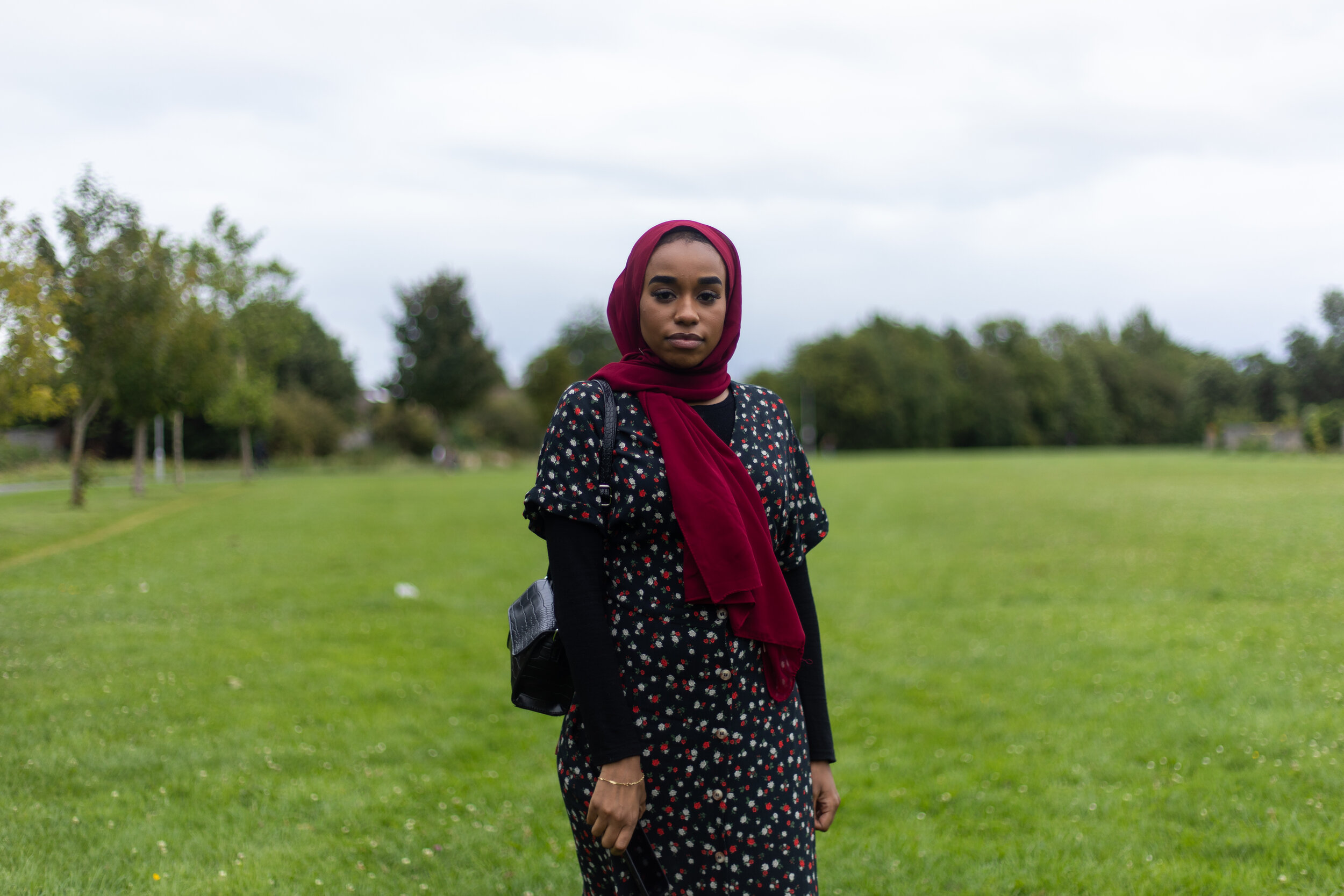
“I'm Sudanese, but my dad is Iraqi, and my mum is Irish. I was adopted as a baby by an Iraqi-Irish couple. Long story short, they found and adopted me from Sudan, becoming my parents. That's my background - an interracial couple. I visited Sudan in 2017 for the first time since being adopted. Attending a wedding was emotional. Despite speaking Arabic, I was still seen as an outsider because I was raised outside Sudan. They referred to me as "Khawaja" throughout the trip. It's like moving from a place in Ireland where I don't look Irish and people say I'm not Irish, to Sudan where I thought I'd fit in, but I'm seen as Irish. It's a strange connection. Back in Ireland, I'm told I'm not Irish enough and to go back to Sudan. I haven't been to Iraq, so I can't say about that.”
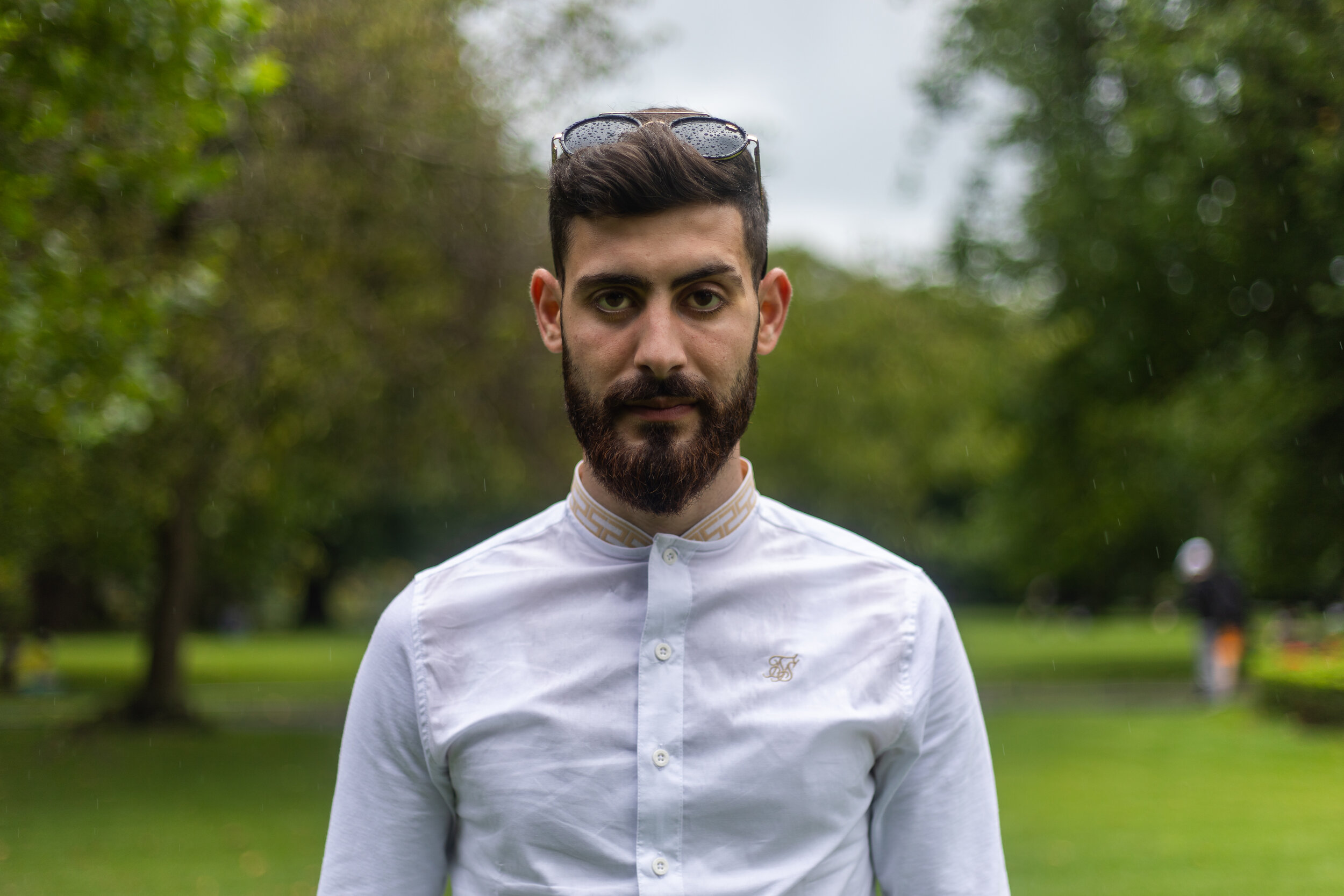
“I might not have been born in Ireland. It's a place I had never heard of before coming to live here. When the UN informed us about Ireland, my family and I had to search for it online. We had a choice between France and here. Our initial thought was that if we chose France, we might not be able to practice our faith freely due to the discrimination Muslims face there. Opting for Ireland was a leap into the unknown, especially since we weren't going to be residing in the capital. However, what we discovered were friendly people who enjoy smiling and laughing. (as they would say) That's what I've embraced from the Irish identity and integrated into my own.”










"The Irish identity is undoubtedly a part of who I am, as I hail from Clare. While some might label me as being from the countryside, I know that people in Dublin often view it that way. It's not just the physical location, but it's also reflected in how I conduct myself, my way of speaking, and the company I keep. I've become deeply ingrained in the local culture here, which is distinctly different from my homeland's culture. I don't genuinely align myself with Pakistani culture, to be completely frank. Except for when I'm at home, my identification is more connected with my religion rather than Pakistani customs. I do acknowledge my uniqueness, and I consistently remind myself that I stand apart from the crowd, not adhering to the norms of the Irish people around me. This recognition empowers me to fully embrace my religion."
"I was born and raised here. My mother is Irish too, so a significant part of my identity is Irish. I've known no other way of life. Having a Caribbean father and an Irish mother, both of whom embraced Islam, is a true blessing. Their courage to let go of much of their original cultures, as they didn't align well with Islam, is something I admire. As I was growing up, my experiences were predominantly influenced by Islamic culture, though elements like food may have differed. I'm truly grateful that my upbringing was centered around Islamic values. While I used to visit my Irish relatives up North in Derry, there always seemed to be something missing. The connection there was more about blood than shared faith. Growing up within the Muslim community, attending a Muslim National School, I formed a strong bond with that aspect of my identity. My Muslim friends became more than just friends; they became a second family to me."
"I hail from North Dublin, with a heritage deeply rooted in Irish culture. Growing up, Christmas and Sunday dinners were fixtures in my life, as was attending church and participating in my communion and confirmation ceremonies. A pivotal moment occurred when I engaged in a conversation with a friend about the hijab, eventually leading me to embrace Islam and take my shahada on a Friday—a fresh start that empowered me.
Since then, I proudly wear the hijab, using each act of kindness as a testament to my faith. However, my father expressed concerns about potential racial attacks after I began wearing the hijab. While my family embraced my faith, wearing the hijab remains a personal commitment to Allah and myself."
“As a Palestinian, we share the same identity as the Irish by fighting the oppressors. The Irish are freedom fighters. By sharing the same history, it makes you want to live in a free state like Ireland. You want to be free like the Irish, and that is my Irish Identity.”
“When I first think of myself, my initial thought is that I'm Muslim. It's the way Islam governs me. I try to do everything according to the guidelines in Islam. It's a really important part of me. At times, I do feel Irish, and at times I don't. I don't know why that is, but maybe it's because I don't look like the typical Irish person or have an Irish accent. I know other Africans who do, but I don't. Even though I don't know any other place besides Ireland since I was born here, it still feels odd at times.”
“Egypt will always have a place in my heart, and so will Ireland, the place I resided. But I will always be seen as a foreigner here in Ireland, even if you're born here. But even when I go to Egypt, I am also seen as a foreigner. They don’t think that you're one of them. Obviously, you’re coming from Europe and Ireland; it's different. In both places, I'm not seen as one of them. Not being recognized as Egyptian when going to Egypt is good in a way. Everyone goes to ask you questions like how's this and that, especially about growing up in Europe. I'm made to feel like a celebrity, but it's nothing but excitement when I go over there.”
I feel like I don't always fit into both my Muslim and my Irish community. Because the Irish I hang out with are the very stereotypical type of Irish girls, I don't do all the things they may do or go to the places the might go to or hang around the same people they hang out with, and sometimes I feel that can make me separated from them. But it never made me feel not welcomed in Ireland. I don't fully fit into the Muslim community because I spend time with people who are not Muslim, the majority of my friends are not Muslim, and my school only has two other Muslims. So I don't fall into a Muslim circle I think I fit into a bit of both, which is part of my identity: that I'm equally in a Muslim society and an Irish ”
"My Irish citizenship is affording me a better education. It boasts a good healthcare system and robust support for its citizens. If I were in Algeria, I wouldn't have access to this type of support. They lack support for people with disabilities and have no schools that cater to those with disabilities. I was the 25th person born with Apert Syndrome in Ireland. Because of the support, I am who I am today. All the surgeries that I had were a mix of ups and downs for me, which impacted me. I had to stay in different hospitals for a while. All of the struggles and journeys that I've been through have made me a strong person. Alhamdulillah."
“I'm Sudanese, but my dad is Iraqi, and my mum is Irish. I was adopted as a baby by an Iraqi-Irish couple. Long story short, they found and adopted me from Sudan, becoming my parents. That's my background - an interracial couple. I visited Sudan in 2017 for the first time since being adopted. Attending a wedding was emotional. Despite speaking Arabic, I was still seen as an outsider because I was raised outside Sudan. They referred to me as "Khawaja" throughout the trip. It's like moving from a place in Ireland where I don't look Irish and people say I'm not Irish, to Sudan where I thought I'd fit in, but I'm seen as Irish. It's a strange connection. Back in Ireland, I'm told I'm not Irish enough and to go back to Sudan. I haven't been to Iraq, so I can't say about that.”
“I might not have been born in Ireland. It's a place I had never heard of before coming to live here. When the UN informed us about Ireland, my family and I had to search for it online. We had a choice between France and here. Our initial thought was that if we chose France, we might not be able to practice our faith freely due to the discrimination Muslims face there. Opting for Ireland was a leap into the unknown, especially since we weren't going to be residing in the capital. However, what we discovered were friendly people who enjoy smiling and laughing. (as they would say) That's what I've embraced from the Irish identity and integrated into my own.”